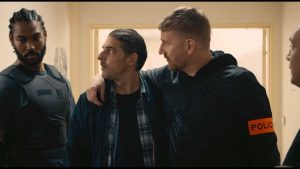(Akiit.com) An itchy trigger finger shoots a gun. Someone gets hit and now there’s blood on the streets…
Writer/first-time feature director Ladj Ly masterfully pays respect to the most crucial elements of cop/crime/thrillers. And though, in his first feature film, he respects genre norms he also exceeds expectations, using lively characters and true events from his past to create perceptive day-in-the-life observations. Something like a sociology lesson.
In his world, the unique low-income neighborhood of Montfermeil, just east of Paris, is home. It’s the same setting as Victor Hugo’s classic novel Les Misérables (aka The Wretched Poor). Same place that spawned the 2005 French Riots. Ethnic immigrant groups live in low-income projects and there’s a social strata based on skin color, religion, gender, age and class. 
In his story, France wins the World Cup. There‘s jubilation in the streets. People of all classes and backgrounds celebrate, bringing a group euphoria as they surround the Arc de Triomphe in Paris’ tony 8th arrondissement. As the crowd disperses, some head back to the slums of Montfermeil, miles away from city center, where a myriad of struggling immigrants both clash and coexist.
It’s the first day on the job for Brigadier Stéphane Ruiz (Damien Bonnard), an altruistic policeman who has transferred into the district to be near his son. He’s partnered with Chris (Alexis Manenti), a white racist cop who knows the community’s lowlife players and Gwada (Djibril Zonga) an Afro/French officer.
The three, an anti-crime squad, patrol the streets. Each has a distinct approach to community relations. The new policeman is a humanist. The bigoted cop favors intimidation and violence. Chris: “Never say sorry.” The middle-of-the-road cop, who looks like the citizens they serve, is torn.
Neighbors align within territorial factions and hierarchies: The school-age boys are The Bugs, headed by Issa (Issa Perica). There’s the High School Girls. The Gypsies, led by Zorro (Raymond Lopez). The Muslim Brotherhood. And a community leader named The Mayor (Steve Tientcheu). On the streets, they go about their business. Behind that façade, the juvenile delinquents and scheming criminal adults cause problems.
Liaisons between the patrolmen and citizens are fragile. It isn’t long before a powder keg of ill feelings explodes, ignited by a cop’s blunder. A crisis ensues. The trio panics. Not out of a sense of remorse, more because a drone has filmed their movements.
Ladj Ly, a filmmaker of Mali descent, was raised in the Montfermeil (Seine-Saint-Denis) projects. As he depicts what he saw—clans, rivalries, police malfeasance, kingpins—those memories become a strong foundation for his compelling script (co-written with Giordano Gederlini and Alexis Manenti). Under his guidance, in the shadows of Paris, with a combustible mixture of struggling ethnic groups, this engrossing urban tale brims with tension, intrigue, anger, violence and retribution. Much of it with a vibrant authenticity.
Ly‘s stark realism, also exemplified by his documentary-style filmmaking, is fairly evocative for 102 minutes and gives the film a soul. But it’s a core that has hairline cracks: Sometimes the lighting (cinematographer Julien Poupard), especially hallway scenes, looks blaring and artificial. The cast’s clothes (costume designer Marine Galliano), though modern and hip, look way too new and unworn. Also, there are moments when the pacing lags (editor Flora Volpelière).
Still, the staging, camera angles and composition are consistent. Glimpses of grim buildings, alleys, dingy apartments and police cars draw you into a life on the edge. Ly deftly guides the adult actors through their paces as they get to say his very astute dialogue in their police banter or exchanges between the locals: “A dog barks. Why can’t he bite?”
Damien Bonnard is perfectly cast as the wide-eyed cop shaken by a new assignment that challenges his values. He displays the right blend of innocence, know-how and courage. Alexis Manenti, as a one-dimensional rogue cop, is demonic. By the end of the film you want to wrestle his gun away and pistol whip him. Djibril Zonga wears his character’s ambivalence on his face.
Steve Tientcheu, as The Mayor, knows how to lose his soul on cue. There is something almost biblical about the way he straddles right and wrong. He’s a consummate weasel. Jeanne Balibar as the Police Chief is a stroke of genius casting.
The ensemble of kids are novices. Believable sometimes. Sometimes not. When the boys stage a rebellion, it seemslike their anger isn’t truly lethal. Issa Perica and Al-Hassan Ly (Ladyj’s son) rise above the fray, closer to the level of Fernando Ramos da Silva in the Brazilian film Pixote.
Someday, when you look up the definition of “cinema-verité” you’ll likely see a photo of Ladj Ly and his film Les Misérables among the better examples of this ever-evolving filmmaking style.
Columnist; Dwight Brown
Official website; http://DwightBrownInk.com









Leave a Reply